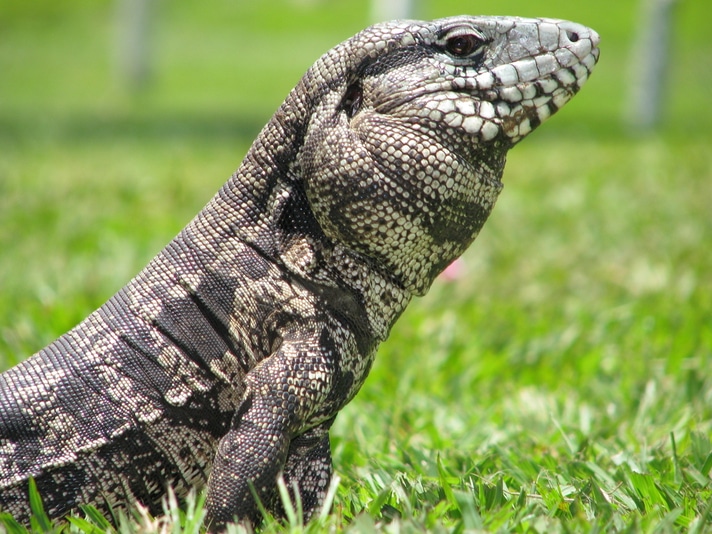It goes without saying that you need to feed your pets regularly, regardless of their size, age, or species. However, the relationship between reptile
It goes without saying that you need to feed your pets regularly, regardless of their size, age, or species. However, the relationship between reptiles and their food is a bit more complicated than with other pets. Reptiles can be extremely picky eaters— just ask any experienced herp or breeder.
But what does this mean for you and your pet tegu?
Well, tegus aren’t quite as particular with their food when compared to ball pythons, hognoses, or other reptiles. Being closely related to monitors, tegus are an omnivorous and opportunistic member of the Teiidae family.
But if you want to have a long, happy, and rewarding relationship with your pet, there are some measures you should be taking in order to provide a positive relationship between your pet and its food.
Diet and Nutrition
Since tegus are omnivores, they can eat a wide variety of foods. But which foods are good for them and which should be avoided?
The general consensus among reptile experts is to feed your tegu a diet made up of fruits, veggies, and a significant protein source— while avoiding any avocados, mushrooms, and onions. The specifics are largely up to you, but there are some additional factors to keep in mind when deciding what kinds of foods in these nutritional groups to feed your tegu.
One thing to carefully track is the ratio of calcium to phosphorus in your tegu’s food. Failing to maintain a 2:1 balance can lead to significant health issues, so it’s a good idea to structure your pet’s diet around this balance. For vegetables, dandelion greens and collard greens are a fantastic choice. When it comes to fruit, try and provide more berries and less banana. But what about protein?
This is a topic that has led to a lot of debate among herps and breeders. In particular, people can’t seem to decide whether or not to feed tegus whole prey. Those who are against it warn that it can lead to health issues such as impaction and obesity. However, I believe that finding the right kind of whole prey — such as quail or rabbit — can offer tremendous health benefits for your pet, especially when it comes to calcium and phosphorus.
If you’re worried about finding the best diet for your tegu, or are having trouble sourcing the best foods, you can always feed your pet whole-prey links. Reptilinks offers Megablend + Fruits and Veggies links are a great choice since they offer all the ingredients required to provide your tegu with a positive relationship to their food.
Training and Positive Reinforcement
Why do people get tegus as pets in the first place?
Among other reasons, many tegu owners cite intelligence as a key factor in their decision. Much like a dog, tegu owners have managed to train their pets to perform different behaviors: playing fetch, relieving themselves in a designated area, and being walked on a leash, just to name a few.
However, this kind of training is only possible if your tegu is happy and healthy. In a safe environment, you can start building up these behaviors with your pet by practicing positive reinforcement— rewarding him or her for doing what you want instead of punishing when they don’t.
This is another situation where varying your tegu’s diet can serve a valuable purpose. Since tegus have such impressive cognitive ability, they can notice variations in their diet and develop a taste for particular foods. This makes it easier to reward positive behavior with treats.
Additionally, tegus are some of the biggest reptiles. This naturally means they eat frequently to maintain that mass. In general, tegu hatchlings are supposed to be fed every day and adult tegus every three days. With so many frequent feedings, you can have training sessions with your pet tegu more often than you would otherwise be able to with reptiles that only eat once a week.
If you’re interested in training your tegu in this way, it’s as simple of giving him or her a small amount of their favorite food. But if you’re not sure if your tegu has a favorite food, or if you’re concerned about its effects on your pet’s health, our Tegu Hatchling Bundle is a good alternative. In addition to having a similar combination of healthy ingredients, it comes uncased— which makes it easier to feed your pet in small amounts.
Whether or not you want to train your tegu, it’s important to ensure that your pet is getting the most out of his or her diet. Establishing a positive relationship like this will ensure that you get to enjoy your pet for as long as possible and vise versa.
Nick Helble operates and owns Reptilinks Whole Prey, and has been a professional reptile breeder and enthusiast for over 25 years. His facility in Blanchester, Ohio houses an assortment of locality specific boa constrictors, various species of pythons, Mexican black king snakes, tegu and monitor lizards, and Argentine horned frogs.



